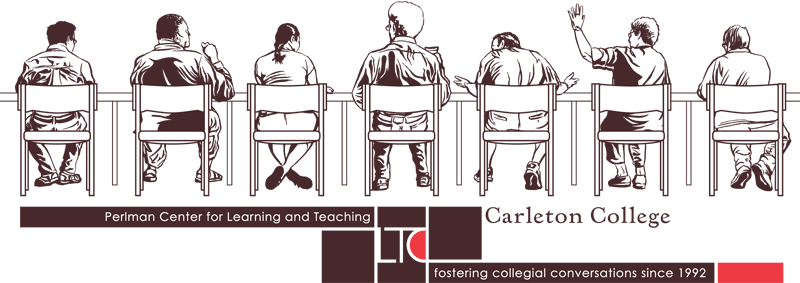The Learning Community

Categories
Fall 2016 (November 4, 2016)
One of the things I enjoy most about my new role is listening to faculty across campus reflect on what they are trying in their classrooms and why. I’m continually struck by how much creativity and critical reflection there is in our teaching, and yet we don’t always do a good job of communicating this important work to each other or to the community of peers beyond Carleton. LTC lunches highlight only a small fraction of the innovative approaches we are using in our classrooms or the challenges we are tackling.
In the midst of national conversations about issues of diversity on campus, Carleton students, faculty, and staff have been considering how best to attend to these issues here on campus. The September faculty retreat provided an opportunity to reflect on the information gathered from student focus groups last year, but not enough time for considering concrete ways to respond. These topics merit ongoing conversation. The LTC is one venue that can foster conversations and help faculty build their teaching toolboxes to create classrooms where students with diverse backgrounds and identities can flourish.
The LTC student fellows are one of the LTC’s hidden assets. For 2016-2017, the three student fellows are Jocelene Caballero ’17 (Psychology/Educational Studies), Caleb Rakestraw-Morn ’17 (Philosophy), and Issa Wilson ’18 (Studio Art). This fall the fellows facilitated a book group on Sherry Turkle’s Reclaiming Conversation in addition to working with faculty through the student observer program.
The most common way faculty engage the student observer program is to have a LTC fellow sit in on single class or a series of classes and observe particular aspects of the class, but LTC fellows can be valuable partners in other ways. For example, if paper course evaluations aren’t able to get at the nuances of what you would like to learn from your students, you might consider inviting a LTC fellow to host a midterm or end-of-term conversation with your students to collect anonymous feedback to be shared with you. If you're interested in participating, use the online request form.
One theme in the LTC programming this term has been the possibilities that open when we think about curriculum that is not limited to 10-week, 6-credit, single-instructor courses. The winter break OCS programs that span two terms, the CUBE program that includes an online summer component and a face-to-face on-campus component, and trailing courses like those offered by GEI (the Mellon-funded Global Engagement Initaitive) and EthIC (Ethical Inquiry at Carleton) provide flexibility that allow us to engage our students in new ways. At the LTC speed dating event in October, there was excitement about collaborative possibilities that ranged from shared micro-courses to multi-course digital projects. However, significant curricular innovation or collaboration requires time to reflect, converse, and experiment, and time is scarce!
Grant-funded initiatives have traditionally been valuable in fostering collaborative work and curricular experimentation, but when the grant ends, sustaining these efforts is difficult. I’m interested in finding ways that the LTC can better support faculty who want to develop collaborative curricular projects or engage in curricular experiments -- whether those efforts are exploring how to highlight connections across disciplines or how to employ pedagogical approaches that capitalize on new technologies. Isolation rarely leads to innovation so finding ways to create space for faculty and staff to brainstorm and experiment together in supportive company is important both for our vitality as teachers and for the vitality of our curriculum. One possibility is having the LTC support communities of practice around shared interests for a term or an academic year; another possibility is reconsidering the way in which the LTC structures the opportunities for teaching circles. Stay tuned!